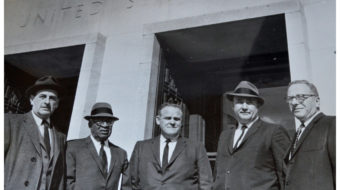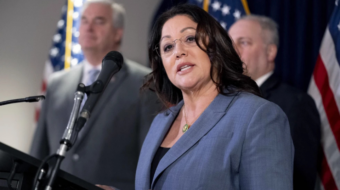MIAMI — Hector Capote, a Cuban immigrant, told the nation’s new secretary of labor and the crowd that packed the African-Methodist Episcopal Church here March 2 that after 14 years of dead-end jobs, “many of them off the books, off the clock, and with no pay,” he finally has a good union job.
When he got the job at AT&T Wireless, he helped organize his co-workers into Local 3122 of the Communications Workers of America. The company recognized the union after a majority of its employees signed cards indicating that they wanted union representation.
Capote told Labor Secretary Hilda Solis how proud he was of his job and how proud he was that she was here, in the heart of south Miami, an area hit extra hard by the “Bush crash.”
He tried, but failed, to hold back his tears as he spoke of his father, “who, in the entire lifetime that he lived, never made more than $13 an hour, never had a union, never had health care, sacrificed and went without, and gave everything he had to hold our family together.”
“I only thank God that I had a chance, as a union worker, and my sister too, who is a union nurse, to provide for him some of the things he otherwise never would have had,” Capote said. “Without the union I could never have paid him back.
“Nobody should have to struggle that hard to live,” he said, “and that is why no one here can rest until we see the Employee Free Choice Act become the law of the land.”
As Solis reached over and embraced Capote the crowd, among them hundreds of trade union leaders and activists, and hundreds of Miami workers — white, black, Cuban and Central American — rose to their feet in prolonged applause.
The rally was the kickoff for a four-day meeting here of the AFL-CIO’s executive council. It was the first public appearance by Solis, a former California congresswoman, after only five days on her new job.
The multiracial crowd who packed the church could barely conceal their joy.
“We’ve been cut out and pushed out for so long,” Dwayne Whitney, president of Local 1416, International Longshoremen’s Association, told the World. “What a pleasure and a joy to have a member of the president’s Cabinet come to our union hall and then spend the night with workers in Miami.” Solis had spent a half hour prior to the rally at Whitney’s union hall, talking to workers and union leaders.
At the rally workers walked up to a microphone where they presented their issues to Solis. Martha Baker, a nurse at Jackson Memorial Hospital, a public hospital, told the secretary, “I work at a health institution that looks at your medical condition, not at what credit card you carry. Health care is a human right and we have had to hold on for dear life against the cuts and against the attacks on public health for the last eight years. We hope that this administration can help.”
Solis assured her that overhaul of the nation’s health care system and provision of health care coverage to “the millions who have been cut out of the system is a top priority for this administration.”
On March 3 Solis joined the AFL-CIO executive council for a private meeting at the headquarters of International Brotherhood of Electrical Workers Local 349. Topics union leaders discussed with her included the fight to pass the Employee Free Choice Act. It would simplify things for workers who want to form a union. Instead of the current situation where employers are in control, the free choice act would give workers the choice of whether to recognize a union through signing cards or an election. Solis was a sponsor of the legislation when she was in the House of Representatives and Obama was a sponsor when he was in the Senate.
Randi Weingarten, president of the American Federation of Teachers, told the World that union leaders had made the point with Solis that passage of the bill is key to restoring the U.S. economy.
The labor leaders emphasized that employee free choice “is really the only way to build up working people to the point that many more will have good paying jobs and therefore entire communities, including businesses, will be better off,” Weingarten said. “Consumers with more to spend create more demand and therefore more jobs. That, more than anything else is the key.”
CWA President Larry Cohen said after the meeting that he was “satisfied that the secretary of labor and the president support the Employee Free Choice Act, but we cannot be complacent.”
“ The labor movement must step up its mobilization, particularly the activities in target states,” Cohen told the World. “The opponents of workers rights are spending many millions and we must be on our guard.”
Solis toured the apprentice training program run by the IBEW local, where African American, Latino and white youth receive training in electrical work skills.
Asked why she had spent two of her first six days on the job with workers and union members in some of the most economically devastated parts of this city, Solis replied:
“It is appropriate that I begin this job here in the house of labor. We see here in Miami some incredible union-run training programs to prepare workers for good jobs that start out at $28 an hour. Every member of Congress should be out here seeing this. This is the kind of thing that we should be seeing stimulus package money going to. That’s how you invest in people and in the future.”
When asked what she will do when she leaves Miami for her new office in Washington, she said, “I have to go to work on resuscitating the Labor Department. We have to start, once again, enforcing the laws that protect workers, we have to start hiring inspectors who will really go out and inspect, we have to build up our job safety programs — in short, we have to rebuild the Labor Department into a department that understands that labor in the backbone of this country.”
jwojcik @ pww.org









